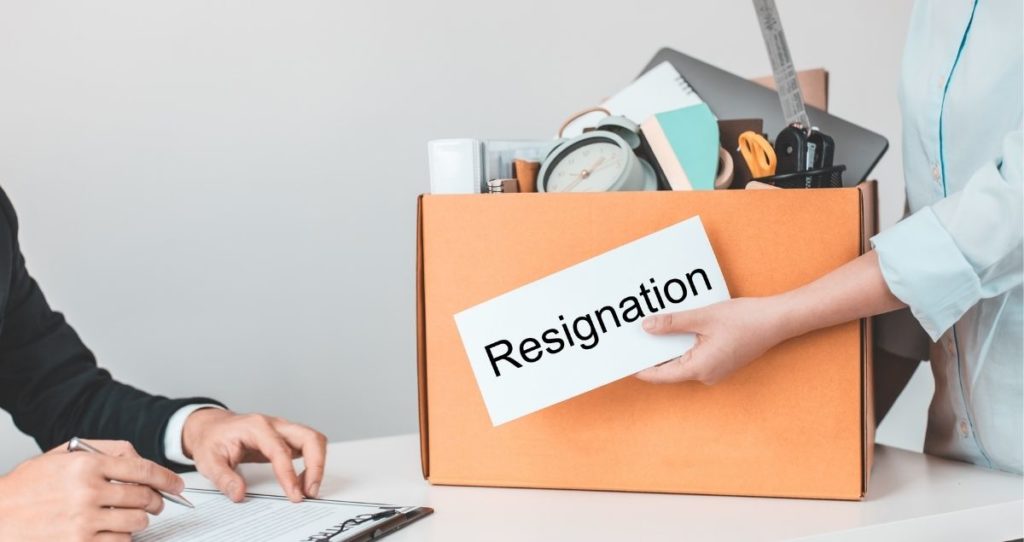What happens to a 401(K) loan when you quit your job? Having a 401(K) plan comes with a lot of benefits. The plan helps you grow your retirement account on a tax-deferred basis and reduce your taxable income. In addition, you can take out a 401(K) loan and pay it off over time. The biggest question regarding these loans, however, is what happens to a 401(K)loan when you quit your job.
Borrowing money from an account that is tied to your employer, comes with its own challenges and setbacks. You don’t know if you will stay there long enough to pay off the 401(K) loan you took out. Your company can restructure and lay you off just like that. You could also be fired or find another job.
The question is: What happens to a 401(K)loan when you quit? Is the 401(K) loan going to be forgiven since you left? Will the company hold money in your 401(K) as a payment? Who pays off your 401(K) loan when you leave your job?
In this article, I will give you answers to these questions and show you exactly what happens to your 401(K) after you have left your job.
What is a 401(K) Plan?
A 401(K) is a popular retirement plan offered by many employers to their qualifying employees. This is a type of profit-sharing plan and some employers impose a vesting period on contributions they make to the plan accounts. This means that you may be required to work in the company for a number of years before contributions from your employer become 100% yours. For example, you could work for a year in the company before you are fully vested. Other employers have a vesting process that happens gradually. For example, you could qualify for 20% of your employer’s contributions after six months, then 75% after 9 months, and finally 100% after a year.
The 401(K) plan allows you to contribute before-tax money from your wages which allows you to reduce your taxable income.
How to grow your 401(K) account?
There are three ways your 401(K) account will grow and they are listed below.
- Returns from investments
- Employer contributions, and
- Your own contributions
Keep in mind that, you will pay income tax on your distributions once you reach retirement.
Some companies allow their 401(K) plan participants to take out 401(K) loans and pay them over time. The requirement for these loans will vary from one company to another.
You must be careful when taking out 401(K) loans as they come with a lot of uncertainties. It is possible that you could leave your job before you pay off your 401(K) loans.
How do 401(K) loans work?
401(K) loans are like any other loans. The only difference is that you are borrowing from an account tied to your company. So, your company will be the one to approve your loan request, and the amount you can borrow from the account is limited.
Once the company approves your application, you will receive the money. Since the 401(K) loan is like any other loan, you will pay the principal and interest on the outstanding balance. You are expected to make all payments necessary until the 401(K) loan is fully paid off. The money you pay will go back into your own account.
Borrowing from your own account could be better than making an early withdrawal from your 401(K) account. This is because premature withdrawals come with a 10% penalty and taxes. So, you can easily avoid these extra financial headaches by taking out a 401(K) loan from the same account.
What happens to a 401(K) loan when you quit
Now that you know you can borrow money from your 401(K), the question is: What happens to a 401(K) loan when you quit your job before paying it off?
Just like any other loans, your 401(K) loans must be paid off based on their terms and conditions. If you quit your job or get laid off, you must pay off your 401(K) loans on time and in full. You cannot disappear and hope that the loan will vanish with you.
Failure to pay off your 401(K) loan will result in a default. What will make this default different from other loans, however, is that it was taken out of your own retirement account. This means that the money you failed to pay off will be considered an early withdrawal from your 401(K). As a result, you will pay taxes and a 10% penalty if you have not reached the age of 59 ½ or older.
According to ED SLOTT and company, your old employer may allow you time to make these payments. However, if you fail to pay it off, your former employer could lower your vested account balance to make up the unpaid amount.
How much can you borrow in 401(K) loans?
Every loan no matter the type or where you get it from will come with a limited amount you can borrow. What makes your 401(K) different is that you are borrowing from your own account. This means that you cannot borrow more than your account value. At the same time, your employer will not allow you to take out everything you have in the account as a loan.
So, how much can you borrow from your 401(K)?
According to Fidelity Investments, you can borrow up to 50% of your total account savings per year. Also, the maximum amount you can borrow cannot go over $50,000. In addition, you must pay off all your 401(K) loans within 5 years. Some companies will require consent from your spouse or family members. Finally, there might be a limited number of outstanding loans you can have on your account.
These rules will differ from one employer to another. Some employers do even allow 401(K) loans.
Pros and cons of 401(K) loans
Pros of 401(K) loans:
- You don’t pay a 10% penalty or tax on the money you borrowed if you pay it off on time
- It is easy to qualify for these loans
- You can borrow up to $50% of your account savings but no more than $50,000. This is a large amount to help you take care of your projects.
Cons of 401(K) loans:
- It is hard to change your 401(K) loan terms
- You lose the opportunity to invest your money
- Every loan comes with risks. So, you will pay a 10% penalty and taxes on the defaulted balance if you are not at least 59 ½.
- You will have a short time to pay off your loan when you quit your job
When is it a bad idea to take out 401(K) loans?
You should always avoid 401(K) loans as much as possible, especially if one or more of the following conditions is true:
- If you can find money from other alternatives
- You are thinking about changing jobs
- When you are in financial hardship already
- You are borrowing money to finance expensive purchases or luxury items
- Your company is undergoing financial difficulties or has been acquired by another company which could end with restructuring
- When you are close to retiring
If any of the above conditions are true, you should not borrow against your own 401(K) retirement plan.
Is it a good idea to take out 401(K) loans?
One of the biggest mistakes people make is to borrow money and fail to pay it off. If you are failing to meet the required payments for a purchase, it is an indication that you are trying to buy something you cannot afford.
Taking 401(K) loans is an extra step in the world of borrowing. That means that you are playing with your retirement savings which is never a good idea regardless of circumstances. If you can avoid taking money from your retirement account, it will be the smartest choice.
When you borrow money from your account, you immediately put yourself in the following positions:
- The risk of losing the money goes higher
- Default chances increase which could trigger taxes and a 10% penalty
- You lose returns on the investments you could have made with that money
For these reasons, you should consider 401(K) loan alternatives before you submit your application.
Alternatives to 401(K) loans
Before you take out 401(K) loans, consider the alternatives. There are many ways you can use to avoid 401(K) loans. For example, you can use these alternatives:
- Consolidate your debt if you wanted money to cover your debt
- Get a HELOC for those who own properties and build equity
- Use the money in your savings account or emergency fund
- Liquidate your physical assets or investments from other accounts
The bottom line to borrowing against your own account is that if you have to go this far, you are trying to finance a purchase you cannot afford. And this is the biggest problem many people face. A smart decision you can make here is to delay the purchase, work hard, reduce your expenses and increase your savings, and make the purchase only when you have the money. You will never have regrets about this move.








